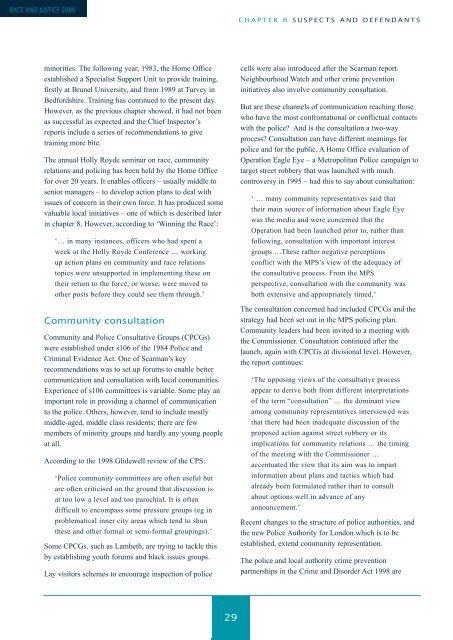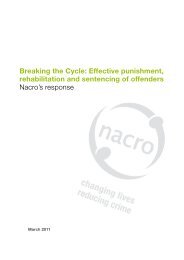Let's get it right: race and justice 2000 - Nacro
Let's get it right: race and justice 2000 - Nacro
Let's get it right: race and justice 2000 - Nacro
- No tags were found...
You also want an ePaper? Increase the reach of your titles
YUMPU automatically turns print PDFs into web optimized ePapers that Google loves.
RACE AND JUSTICE <strong>2000</strong>CHAPTER 6 SUSPECTS AND DEFENDANTSminor<strong>it</strong>ies. The following year, 1983, the Home Officeestablished a Specialist Support Un<strong>it</strong> to provide training,firstly at Brunel Univers<strong>it</strong>y, <strong>and</strong> from 1989 at Turvey inBedfordshire. Training has continued to the present day.However, as the previous chapter showed, <strong>it</strong> had not beenas successful as expected <strong>and</strong> the Chief Inspector’sreports include a series of recommendations to givetraining more b<strong>it</strong>e.The annual Holly Royde seminar on <strong>race</strong>, commun<strong>it</strong>yrelations <strong>and</strong> policing has been held by the Home Officefor over 20 years. It enables officers – usually middle tosenior managers – to develop action plans to deal w<strong>it</strong>hissues of concern in their own force. It has produced somevaluable local in<strong>it</strong>iatives – one of which is described laterin chapter 8. However, according to ‘Winning the Race’:‘… in many instances, officers who had spent aweek at the Holly Royde Conference … workingup action plans on commun<strong>it</strong>y <strong>and</strong> <strong>race</strong> relationstopics were unsupported in implementing these ontheir return to the force, or worse, were moved toother posts before they could see them through.’Commun<strong>it</strong>y consultationCommun<strong>it</strong>y <strong>and</strong> Police Consultative Groups (CPCGs)were established under s106 of the 1984 Police <strong>and</strong>Criminal Evidence Act. One of Scarman’s keyrecommendations was to set up forums to enable bettercommunication <strong>and</strong> consultation w<strong>it</strong>h local commun<strong>it</strong>ies.Experience of s106 comm<strong>it</strong>tees is variable. Some play animportant role in providing a channel of communicationto the police. Others, however, tend to include mostlymiddle-aged, middle class residents; there are fewmembers of minor<strong>it</strong>y groups <strong>and</strong> hardly any young peopleat all.According to the 1998 Glidewell review of the CPS:‘Police commun<strong>it</strong>y comm<strong>it</strong>tees are often useful butare often cr<strong>it</strong>icised on the ground that discussion isat too low a level <strong>and</strong> too parochial. It is oftendifficult to encompass some pressure groups (eg inproblematical inner c<strong>it</strong>y areas which tend to shunthese <strong>and</strong> other formal or semi-formal groupings).’Some CPCGs, such as Lambeth, are trying to tackle thisby establishing youth forums <strong>and</strong> black issues groups.Lay vis<strong>it</strong>ors schemes to encourage inspection of policecells were also introduced after the Scarman report.Neighbourhood Watch <strong>and</strong> other crime preventionin<strong>it</strong>iatives also involve commun<strong>it</strong>y consultation.But are these channels of communication reaching thosewho have the most confrontational or conflictual contactsw<strong>it</strong>h the police? And is the consultation a two-wayprocess? Consultation can have different meanings forpolice <strong>and</strong> for the public. A Home Office evaluation ofOperation Eagle Eye – a Metropol<strong>it</strong>an Police campaign totar<strong>get</strong> street robbery that was launched w<strong>it</strong>h muchcontroversy in 1995 – had this to say about consultation:‘ … many commun<strong>it</strong>y representatives said thattheir main source of information about Eagle Eyewas the media <strong>and</strong> were concerned that theOperation had been launched prior to, rather thanfollowing, consultation w<strong>it</strong>h important interestgroups …These rather negative perceptionsconflict w<strong>it</strong>h the MPS’s view of the adequacy ofthe consultative process. From the MPSperspective, consultation w<strong>it</strong>h the commun<strong>it</strong>y wasboth extensive <strong>and</strong> appropriately timed.’The consultation concerned had included CPCGs <strong>and</strong> thestrategy had been set out in the MPS policing plan.Commun<strong>it</strong>y leaders had been inv<strong>it</strong>ed to a meeting w<strong>it</strong>hthe Commissioner. Consultation continued after thelaunch, again w<strong>it</strong>h CPCGs at divisional level. However,the report continues:‘The opposing views of the consultative processappear to derive both from different interpretationsof the term “consultation” … the dominant viewamong commun<strong>it</strong>y representatives interviewed wasthat there had been inadequate discussion of theproposed action against street robbery or <strong>it</strong>simplications for commun<strong>it</strong>y relations … the timingof the meeting w<strong>it</strong>h the Commissioner …accentuated the view that <strong>it</strong>s aim was to impartinformation about plans <strong>and</strong> tactics which hadalready been formulated rather than to consultabout options well in advance of anyannouncement.’Recent changes to the structure of police author<strong>it</strong>ies, <strong>and</strong>the new Police Author<strong>it</strong>y for London which is to beestablished, extend commun<strong>it</strong>y representation.The police <strong>and</strong> local author<strong>it</strong>y crime preventionpartnerships in the Crime <strong>and</strong> Disorder Act 1998 are29

















